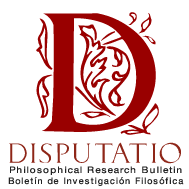Emanuele Lacca
University of South Bohemia, Czech Republic | emanuele.lacca@gmail.com
Received: 30-October-2018 | Accepted: 22-December-2018 | Published: 31-December-2018
Disputatio [Dec. 2018], Vol. 7, No. 8, a031 | DOI: 10.5281/zenodo.3568673
Article | [SP] | Full Text | Statistics | Copyright Notice [es] | Vol. 7 No. 8
How to cite this article:
Lacca, Emanuele (2018). «Límites y contradicciones de la justicia humana. Pedro de Ledesma (1544-1616) sobre la acción moral». Disputatio. Philosophical Research Bulletin 7, no. 8: a031.
Abstract | The aim of this contribution is to show the theory of justice of the Dominican Pedro de Ledesma (1544-1616), expositively and following step by step the ideas contained in the pages of one of his most important works, the Suma Moral (Salamanca, 1598). In this contribution we will see how the Dominican deals with the concept of justice and, at the same time, how he attributes to moral action the dependence on that concept. To this purpose, some sections of the fifth, sixth, seventh and eighth treatises of the second part of the Suma, which deal respectively with justice, legal justice, distributive justice and commutative justice, will be taken into account.
Keywords | Pedro de Ledesma · Moral Action · Legal Justice · Distributive Justice · Commutative Justice.
![]()
Límites y contradicciones de la justicia humana. Pedro de Ledesma (1544-1616) sobre la acción moral
Resumen | El objetivo de esta contribución es mostrar la teoría de la justicia del dominico Pedro de Ledesma (1544-1616), de forma expositiva y siguiendo paso a paso las ideas contenidas en las páginas de una de sus obras más importantes, la Suma Moral (Salamanca, 1598). En esta contribución se verá cómo el dominico trata el concepto de justicia y, al mismo tiempo, cómo atribuye a la acción moral la dependencia de ese concepto. Para ello se tendrán en cuenta algunos apartados de los tratados quinto, sexto, séptimo y octavo de la segunda parte de la Suma, que tratan respectivamente de la justicia, de la justicia legal, de la justicia distributiva y de la justicia conmutativa..
Palabras Clave | Pedro de Ledesma · Acción moral · Justicia legal · Justicia distributiva · Justicia conmutativa.
References
Aristóteles (1985). Ética Nicomáquea. Julio Pallí Bonet (traductor). Madrid: Gredos.
Bruguès, Jean-Luis (2017). Corso di Teologia Morale Fondamentale. Bologna: ESD.
Gutierrez Vega, Luis (1964). «Domingo Báñez, filósofo existencial». Estudios Filosóficos 1: pp. 80-95.
Lacca, Emanuele (2019). «A cada uno sus meritos y dignidad. Pedro de Ledesma (1544-1616) on Distributive Justice and Human Dignity Between Will and Knowledge». Revista Portuguesa de Filosofía 75, no. 2: pp. 981-1000.
Langella, Simona (2018). «Vitoria y la teología como ciencia». Azafea 20: pp. 37-53.
Martínez Morán, Narciso (2003). «Aportaciones de la Escuela de Salamanca al reconocimiento de los derechos humanos». Cuadernos Salmantinos de Filosofía 30: pp. 491-520.
Orrego Sánchez, Santiago (2001). Sobre la perfección del acto de ser creado. Barañain: EUNSA.
Orrego Sánchez, Santiago (2004). «Pedro de Ledesma (Salamanca, s. XVI): contemplación mística de la realidad creata desde el acto de ser». Mediaevalia, Textos e Estudos 23: pp. 381-394.
Pedro de Ledesma (1596). Tractatus de divina perfectione, infinitate et magnitudine. Salamanca: Andreas Renaut.
Pedro de Ledesma (1598). Primera y Segunda parte de la Suma. Salamanca: Ioannes et Andreas Renaut.
Pena González, Miguel Anxo (2015). «Otra forma de Humanismo: la preocupación por el hombre». eHumanista 29: pp. 72-91.
Ramírez, Santiago (1952). «Hacia a renovación de nuestros estudios filosoficos». Estudios Filosóficos 1: pp. 5-26.
Rodríguez Pascuál, Francisco (1977). «Pedro de Ledesma, metafísico salmantino». Cuadernos Salmantinos de Filosofía 4: pp. 127-144.
Tomás de Aquino (2014). Suma teológica. Madrid: BAC.
© The author(s) 2018. This work, published by Disputatio [www.disputatio.eu], is an Open Access article distributed under the terms of the Creative Commons License [BY–NC–ND]. The copy, distribution and public communication of this work will be according to the copyright notice. For inquiries and permissions, please email: boletin@disputatio.eu.

